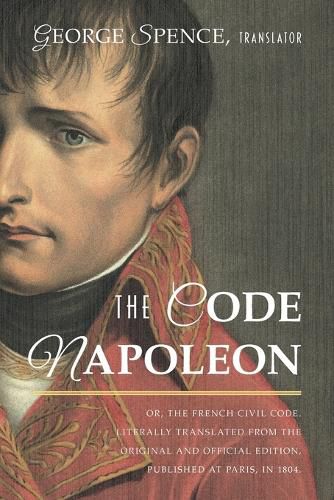Readings Newsletter
Become a Readings Member to make your shopping experience even easier.
Sign in or sign up for free!
You’re not far away from qualifying for FREE standard shipping within Australia
You’ve qualified for FREE standard shipping within Australia
The cart is loading…






This title is printed to order. This book may have been self-published. If so, we cannot guarantee the quality of the content. In the main most books will have gone through the editing process however some may not. We therefore suggest that you be aware of this before ordering this book. If in doubt check either the author or publisher’s details as we are unable to accept any returns unless they are faulty. Please contact us if you have any questions.
Early English translation of the Code Napoleon. xix, 627 pp. Originally published: London: Printed for Charles Hunter, Law Bookseller, 1824. Reprint of the second English edition. A comprehensive reformation and codification of the French civil laws, the Code Napoleon was renamed the Civil Code after the Bourbon restoration, and is still in force. It has served as the model for the legal codes of more than twenty nations throughout the world. The French Revolution overturned many of the hundreds of codes of law that had prevailed from ancient times, and added more than 14,000 pieces of legislation. After the National Convention and Directory failed in five attempts to organize this unwieldy mass, Napoleon appointed a commission to draft the new Civil Code. It was enacted in March 21, 1804, after a three year period of 87 sessions. It embodies a typically Napoleonic mix of liberalism and conservatism. Most of the freedoms won by the revolution, such as equality before the law, freedom of religion and the abolition of feudalism were preserved. At the same time, the Code reinforced patriarchal power by making the husband the ruler of the household. The translator, GEORGE SPENCE [1787-1850], was an English jurist and Barrister of the Inner Temple.
$9.00 standard shipping within Australia
FREE standard shipping within Australia for orders over $100.00
Express & International shipping calculated at checkout
This title is printed to order. This book may have been self-published. If so, we cannot guarantee the quality of the content. In the main most books will have gone through the editing process however some may not. We therefore suggest that you be aware of this before ordering this book. If in doubt check either the author or publisher’s details as we are unable to accept any returns unless they are faulty. Please contact us if you have any questions.
Early English translation of the Code Napoleon. xix, 627 pp. Originally published: London: Printed for Charles Hunter, Law Bookseller, 1824. Reprint of the second English edition. A comprehensive reformation and codification of the French civil laws, the Code Napoleon was renamed the Civil Code after the Bourbon restoration, and is still in force. It has served as the model for the legal codes of more than twenty nations throughout the world. The French Revolution overturned many of the hundreds of codes of law that had prevailed from ancient times, and added more than 14,000 pieces of legislation. After the National Convention and Directory failed in five attempts to organize this unwieldy mass, Napoleon appointed a commission to draft the new Civil Code. It was enacted in March 21, 1804, after a three year period of 87 sessions. It embodies a typically Napoleonic mix of liberalism and conservatism. Most of the freedoms won by the revolution, such as equality before the law, freedom of religion and the abolition of feudalism were preserved. At the same time, the Code reinforced patriarchal power by making the husband the ruler of the household. The translator, GEORGE SPENCE [1787-1850], was an English jurist and Barrister of the Inner Temple.